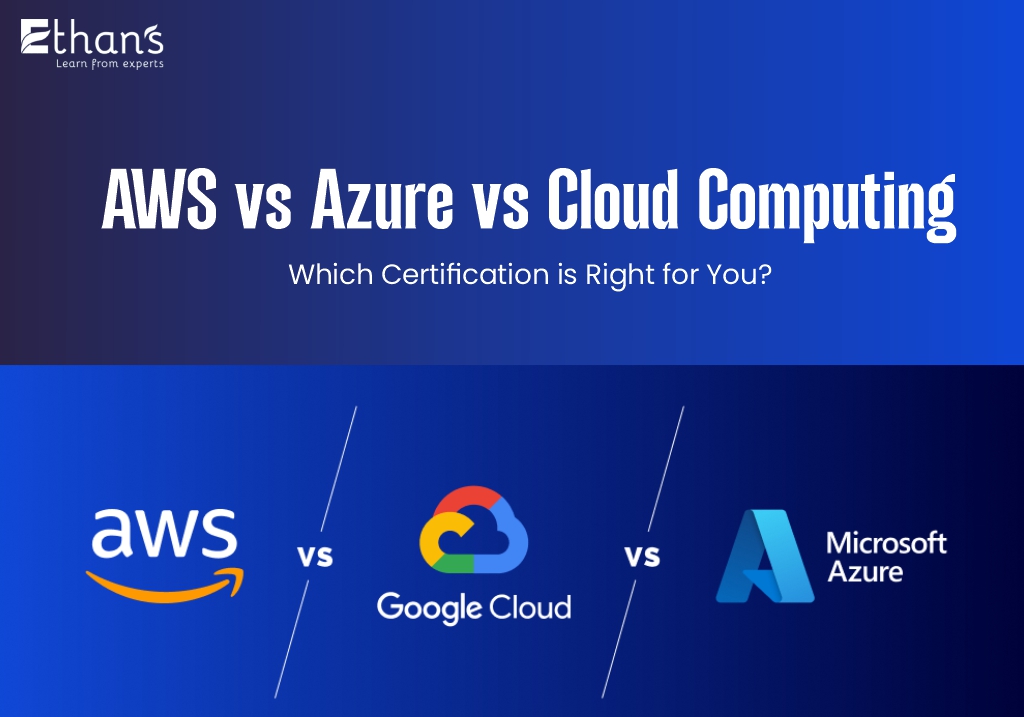Bingo! You’ve asked the right question.
Cloud computing is booming and one of the hottest technologies around.
But yes, following your question, we agree that choosing the right certification matters.
So, to everyone looking to pursue a career in cloud computing but confused about whether to do AWS training in Pune, join Microsoft Azure classes in Pune, or take up general cloud computing, you’ve come to the right place.
We’ll provide a detailed comparison of all these options and provide unbiased insight to help you choose the right certification in your context.
AWS Certifications
Amazon Web Services (AWS) is a global market leader. Hence, it has a comprehensive and well-evolved certification program. AWS offers certifications across various tiers, including foundational certifications, and associate, professional, and specialty training programs.
AWS certifications are profoundly technical and focus on their platforms and services. They usually require learners to have hands-on experience with the AWS console and a practical understanding of AWS’s architectural best practices.
After an AWS training in Pune, you can work across various roles, including DevOps engineer, cloud architect, security specialist, and systems administrator, particularly with companies that work on AWS platforms and adopt the AWS cloud.
Some key AWS certification programs include;
- Certified Cloud Practitioner: Entry-level certification for cloud newbies that validates a basic understanding of AWS concepts, terminologies, and services.
- Certified Developer – Associate: Particularly for developers, this one validates your ability to develop, deploy, and debug cloud-based apps that use AWS services.
- Certified SysOps Administrator – Associate: Focuses on the operational aspects of deploying and managing systems across AWS.
- Certified Solutions Architect – Associate: This focuses on designing and deploying scalable, highly available, and fault-tolerant systems on AWS.
- Professional Level Certifications: Advanced certifications that demand extensive experience and proven technical expertise in domains within the AWS cloud.
Azure Certifications
Second to AWS, Microsoft Azure is rapidly growing, gaining traction worldwide. Just like AWS, Azure’s certification programs have also evolved over the years. Accordingly, it offers various role-based certifications that serve different career needs and aspirations.
Microsoft Azure certifications insist on gaining a broader understanding of cloud concepts and their integration with Microsoft’s ecosystem, including .NET, Windows Server, etc. The courses are technical, while also focusing on how-to aspects within Azure.
Azure certifications are useful for people working in companies that use Azure and a broad array of Microsoft products. Some roles include solutions architect, Azure administrator, security engineer, and data engineer.
Let’s look at some of the key Azure certifications.
- Azure Fundamentals: Basic certification covering basic cloud and Azure concepts
- Azure Administrator Associate: Focuses on implementing, managing, and monitoring a company’s Microsoft Azure ecosystem.
- Azure Solutions Architect Expert: Emphasizes designing and implementing robust and scalable Azure solutions.
- Azure Developer Associate: Validates skills in designing, developing, testing, and maintaining cloud solutions on Azure.
- Azure Security Engineer Associate, Azure Data Engineer Associate: Specialty certifications that focus on specific Azure areas.
Generic Cloud Computing Certifications
Of course, the cloud exists beyond these platforms or providers. So, you can also choose to pursue generic cloud computing certifications that focus on broader cloud concepts, best practices, and principles that you can apply across various cloud platforms.
These certifications don’t focus on a single platform. This is unlike AWS and Azure which are specific to their own ecosystems. Instead, they provide a more comprehensive understanding of cloud computing, while covering topics like security, governance, cloud architecture, and cost management from a platform-agnostic viewpoint.
Accordingly, these certifications benefit roles that require a broader understanding of cloud technologies and that involve working with different cloud platforms or providing consulting solutions to companies for their overall cloud strategy.
AWS vs Azure vs Cloud Computing – Key Differences
So, let’s make the comparison even easier for you to follow.
| Aspect | AWS Certifications | Azure Certifications | Vendor-Neutral Cloud Computing Certifications |
| Platform | Focused on AWS platform and services | Azure platform and services | Broad concepts applicable across multiple platforms |
| Technical Depth | Technically comprehensive, insisting on hands-on skills within AWS | Technically profound, with potential integration with the Microsoft environment | Technical depth can vary based on the course’s objectives. Some are basic, while others are specialized |
| Suitability | For people already working with or planning to use AWS environments | For individuals already associated with Microsoft-based ecosystems | People who want a broader understanding of cloud and become generic experts |
| Entry Level Certification | AWS Certified Cloud Practitioner | Microsoft Certified: Azure Fundamentals | Google Cloud Digital Leader |
| Industry Recognition | Very high | High | Moderate to high |
| Career Roles | DevOps, Solutions Architect and Cloud Engineer | Cloud Consultant, Data Engineer and Azure Admin | Tech Generalist, Entry-Level Cloud Support |
So, Which Certification is Right for You?
- Let’s answer the core question. Which certification amongst AWS, Azure and generic cloud computing is right for you. The choice depends on various factors, including;
- Existing Role and Experience: If you are beginner, you can pursue a foundational certification from AWS or Azure (Cloud Practitioner or Azure Fundamentals) or a vendor-neutral alternative. But if you are experienced, you can take up speciality certifications in your area of focus or interest.
- Career Objectives: If AWS interests you and you want to work with companies using AWS, you can pursue AWS training in Pune. And so, it is with Azure. But if a generic role that involves working with multiple cloud platforms intrigues you or you want to enter a strategic cloud role, you can go for generic cloud certifications.
- Employer’s Requirements: If your company uses Azure, you can pursue Microsoft Azure classes in Pune. But if your employer uses Azure, you should enroll in AWS classes in Pune and work towards the certification you want to obtain.
Final Thoughts!
Cloud computing is on the rise. Hence, any choice is great, whether AWS, Azure or generic cloud computing course. However, individual situations and choices may vary.
We hope the above helps you make an informed choice. Nevertheless, for a detailed and specific discussion, we recommend calling us at +91 95133 92223. Our course experts will help you navigate our course offerings and also answer various other questions concerning our AWS training and Microsoft Azure classes in Pune.





